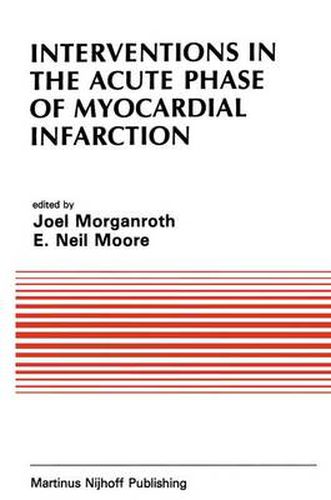Readings Newsletter
Become a Readings Member to make your shopping experience even easier.
Sign in or sign up for free!
You’re not far away from qualifying for FREE standard shipping within Australia
You’ve qualified for FREE standard shipping within Australia
The cart is loading…






This title is printed to order. This book may have been self-published. If so, we cannot guarantee the quality of the content. In the main most books will have gone through the editing process however some may not. We therefore suggest that you be aware of this before ordering this book. If in doubt check either the author or publisher’s details as we are unable to accept any returns unless they are faulty. Please contact us if you have any questions.
In the 1980’s a primary focus for intense cardiovascular research is in the treatment of patients with acute myocardial infarction. Although the prevalence of this syndrome has been decreasing in the United States, still over 1.5 million patients develop myocardial infarction per year. There is about a 20% chance of a North American male developing myocardial in farction before the age of 65. The in-hospital mortality still remains at ap proximately 10070-15070 and advances in pharmacologic and device therapy have allowed for the intensification of research in the treatment of patients with acute myocardial infarction. The following manuscripts represent the collective efforts of academic in vestigators in the United States and abroad as well as members of the phar maceutical industry, and the Food and Drug Administration to address the issues involved in interventions in the acute phase of myocardial infarction. State-of-the-art papers addressing important topics are followed by discus sion sections which have allowed participants to express their own viewpoints leading to a consensus opinion. The first part of this Symposium addresses the models of experimental myocardial infarction followed by the important issue of how one defines myocardial infarction size. The latter is extremely important to be certain that endpoints of therapeutic or device interventions are objective and reproducible. A detailed description of the pharmacological interventions to reduce myocardial infarction size as well as newer devices to effect mechanical and electrical disorders provide an up-to-date summary of current opinion.
$9.00 standard shipping within Australia
FREE standard shipping within Australia for orders over $100.00
Express & International shipping calculated at checkout
This title is printed to order. This book may have been self-published. If so, we cannot guarantee the quality of the content. In the main most books will have gone through the editing process however some may not. We therefore suggest that you be aware of this before ordering this book. If in doubt check either the author or publisher’s details as we are unable to accept any returns unless they are faulty. Please contact us if you have any questions.
In the 1980’s a primary focus for intense cardiovascular research is in the treatment of patients with acute myocardial infarction. Although the prevalence of this syndrome has been decreasing in the United States, still over 1.5 million patients develop myocardial infarction per year. There is about a 20% chance of a North American male developing myocardial in farction before the age of 65. The in-hospital mortality still remains at ap proximately 10070-15070 and advances in pharmacologic and device therapy have allowed for the intensification of research in the treatment of patients with acute myocardial infarction. The following manuscripts represent the collective efforts of academic in vestigators in the United States and abroad as well as members of the phar maceutical industry, and the Food and Drug Administration to address the issues involved in interventions in the acute phase of myocardial infarction. State-of-the-art papers addressing important topics are followed by discus sion sections which have allowed participants to express their own viewpoints leading to a consensus opinion. The first part of this Symposium addresses the models of experimental myocardial infarction followed by the important issue of how one defines myocardial infarction size. The latter is extremely important to be certain that endpoints of therapeutic or device interventions are objective and reproducible. A detailed description of the pharmacological interventions to reduce myocardial infarction size as well as newer devices to effect mechanical and electrical disorders provide an up-to-date summary of current opinion.